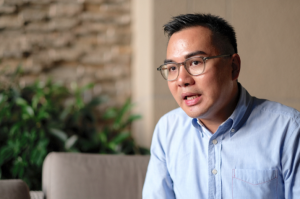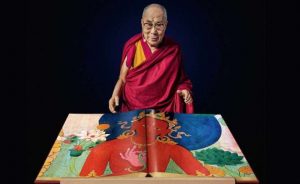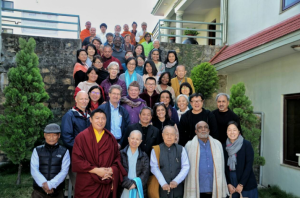
It has been well-known and accepted fact that Buddhism advocates logical reasoning and freedom of questioning as opposed to ‘blind acceptance’. There are not many religious founders or philosophers who were as so outspoken as the Buddha who says – Do not accept even what I say, without reasoning. Such a statement leaves the person above all as the authority – the determiner – to use one’s intellect and come to a conclusion when a truth-claim is made. But, there are misinterpretations of this concept of free-inquiry. And it is particularly dangerous when one is exposed to wrong or improper knowledge leading one far away from the truth.
One major outcome of ‘free-inquiry’ is an increasing number of self-claimed ‘non-religious’ people. To explicate this phenomenon – a common trend in modern society, I give a small example.
In an ‘introduction to science’ class, a professor, attempting to establish ‘religious faith’ as inferior to ‘scientific or objective inquiry’ cites how Darwinian evolutionary theory revolutionized the age-old belief in creation – shattering the belief in God. Further the Professor in a proud and firm voice says that he does not believe in God, never visits any religious institution, attends to no religious function, and, most importantly, does not let his children visit any temple, church, or mosque. It is noteworthy that this professor, seeming so delightful in his understanding of the non-existence of God – which is an outcome of his ‘free-inquiry’ – is playing a role as an authority creating a generation of students in ‘blind-acceptance’ – to accept his own understanding, without encouraging them to explore the other truth-claims – which is totally in contrast to free-inquiry.
Explaining why he does not visit Buddhist monasteries he says that – although there is no place of the Creator God, Buddhism speaks of minor gods dwelling in heavens. “If there is not the father God”, he joked, “how can there be children god, a heaven?” Some students fascinated by this professor’s reasoning gave a ‘loud laugh’!
It is clear from the example that, the position taken by this professor is not of God, or of one submitted to the God, but considering himself as superior to both, perhaps, of a ‘super-God’!
According to Buddhism, free-inquiry is not the ultimate aim or the end in search (or quest) of knowledge or enlightenment. It is a criterion – a means to proper understanding of the truth of things, and ultimately leading to wisdom. One has to adopt free-inquiry with the pure intention (or quest) to know, not to prove one’s smartness boasting of one’s ego. In fact, experiencing the insubstantiality of the ‘ego or self’ is a fundamental aim of Buddhist path.
If free-inquiry is accompanied by the pure intention to know, one would see that human beings are positioned as the best of all the beings on the basis of the fact that only humans can upgrade their intellectuality to the supreme purity, not even gods. Buddhism speaks of obtaining divinity as an outcome of virtuous conduct in this life on earth. The equation is as simple as saying – doing virtuous deeds, at least by keeping to the promise of observing the five precepts, leads to divine abodes. If one is to justify the existence of heaven, Buddhism would simply recommend one to follow the path – which is to live as true human being maintaining the five precepts, to witness the heaven. There is no hiding, restrictions, blind-acceptance, or submission to an authority– the truth-claim is disclosed to be verified by anyone who wishes to do so. Such a position, one may firmly say, does no harm to ‘free-inquiry’. In fact, it contributes much for the well-being of the humanity.
When students are trained to follow the criterion of free-inquiry, they need also to be cautioned – rather warned – of the dangers it entails. Free-inquiry becomes dangerous when one’s ‘ego’ overcomes one’s desire to know. The truth of things is far superior to clinging to the egoistic ideas of ‘I’, ‘me’, or ‘my’. As long as one is not free from ‘I consciousness’ it is impossible to comprehend or experience the truth defined in Buddhism. The exercise of objectivity or free-inquiry is also not fully possible, as seen in the above example, as it leads only to partial knowledge of things, not ‘experiential wisdom’.













